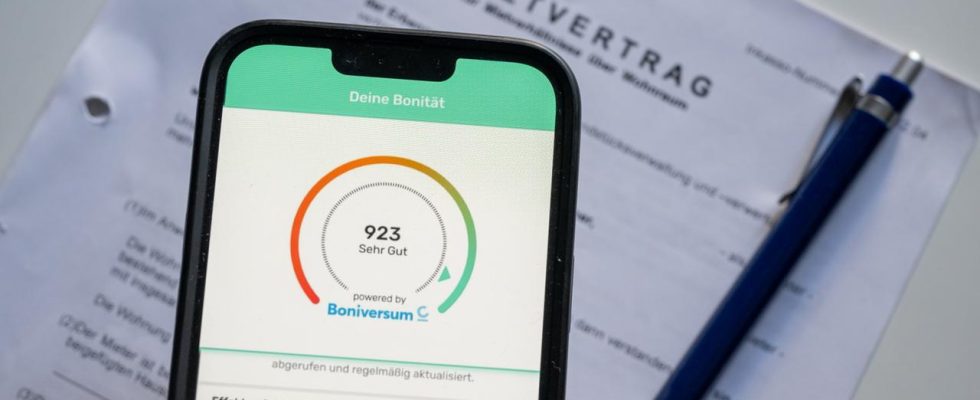background
Retrieve your own creditworthiness via an app – Schufa has been offering this service through a subsidiary since the summer. Consumer advice centers and data protection advocates see problems with the offer.
Rental agreement, car purchase, online shopping or mobile phone contract – nothing works without Schufa. The credit agency uses their Schufa score to indicate how solvent and creditworthy customers are. Data from around 68 million people is stored on the company’s servers.
When making purchases or contracts, the Schufa clause often has to be signed. This gives Schufa permission to forward information to the company. Conversely, she finds out whether loans are paid off on time and how reliably bills are paid. An algorithm uses this and personal data such as place of residence, age and origin to determine the so-called Schufa score.
Most people don’t even know how Schufa classifies them. To simplify access to this information, a subsidiary now offers the “bonify” app. With it, users can view their Schufa rating, the “basic score”, online for free. The offer has been available since July and, according to the company, 80,000 users have already registered.
“More data sovereignty”
“In the future, we want to make the basic score and the creditworthiness-relevant data that we have stored about them available to people at any time and free of charge via ‘bonify’,” Schufa explains to the WDR. “The convenient 24/7 insight into your own data is a central aspect for greater data sovereignty and control.”
In addition, it should be possible in the future to improve your personal credit rating via “bonify”: “For all those who need proof of creditworthiness to take out an installment loan or a credit card and would like to improve their score, we want to offer options in the future “To positively influence the score,” says a Schufa spokeswoman, describing the offer. Translated, this means: If the user allows access to the account data, this could lead to a better credit rating.
Online petition against the “bonify” app
But this is exactly where consumer and data protection advocates see problems. “Consumers could be tricked into revealing more about themselves in the “bonify” app than is necessary. Whether this really leads to better offers or even a better score is completely open,” criticizes Christine Steffen, lawyer Consumer advice center NRW.
The citizens’ movement Finanzwende has even launched an online petition against the app. “Data such as salary or account balance are sensitive and are not Schufa’s business, we believe,” says Michael Möller, consumer protection officer at Finanzwende. “We also doubt whether data sharing would really always be voluntary. Vulnerable groups of people in particular could feel pressured to release further data. Ultimately, more data also means more power for Schufa – a problematic development from our point of view,” said Möller. The credit agency lures people with the hope of better ratings, but actually wants to get sensitive account data.
According to Schufa, it only concerns selected data
Schufa tries to appease and emphasizes that all of these services are still being planned. “There are no concrete concepts yet, just an initial announcement from December 2022 that we are thinking about this and an initial exchange with our consumer advisory board and with data and consumer protection officers.” In addition, it is not about a complete account insight, but rather selected creditworthiness-relevant account data. This concerns the income or the question of whether the account is kept in profit on average.
The NRW consumer advice center points out that registration only works with your ID card or your own bank account. The app is set up so that “bonify” users can permanently view their account for the sales of the last 90 days. “Although Schufa is not currently allowed to use this data to assess creditworthiness, the biggest hurdle has already been overcome by storing the account details,” it says on the consumer advice center’s website.
Concern about data security
The citizens’ movement Finanzwende doubts whether “bonify” knows how to handle the data and points to a security gap that was discovered in the summer. “Particularly absurd: Expensive loans were sometimes brokered through the app that bypassed Schufa and thus essentially undermined their own business model. In our opinion, such reports have fueled doubts about the app rather than dispelled them,” said Möller.
Compared to the WDR Schufa emphasizes that personal or financial data was never hacked during this security gap, as some media have reported. The gap was closed just three hours after the first indications. The so-called “Schufa-free loans” are no longer offered. “bonify” has suspended cooperation with providers of such loans.
Consumer advocates: Obtain information in writing
However, the bumpy start and the circumstances do not inspire confidence among consumer advocates. Lawyer Steffen recommends obtaining free information directly from Schufa in writing, which, in addition to the general basic score, also contains the personal data that is stored about you. This also offers the opportunity to check whether they are correct and, if necessary, have them corrected or deleted.
“If you still want to use the app, we advise you not to look into your account. This is because a lot of sensitive information can be sent to the app provider. Whether all this information is only used for the benefit of the consumer is unclear difficult to estimate,” says Steffen.
At least the good news: According to Schufa, around 87 percent of the population in Germany has a good or very good score. So most people have no reason to need to improve it.

